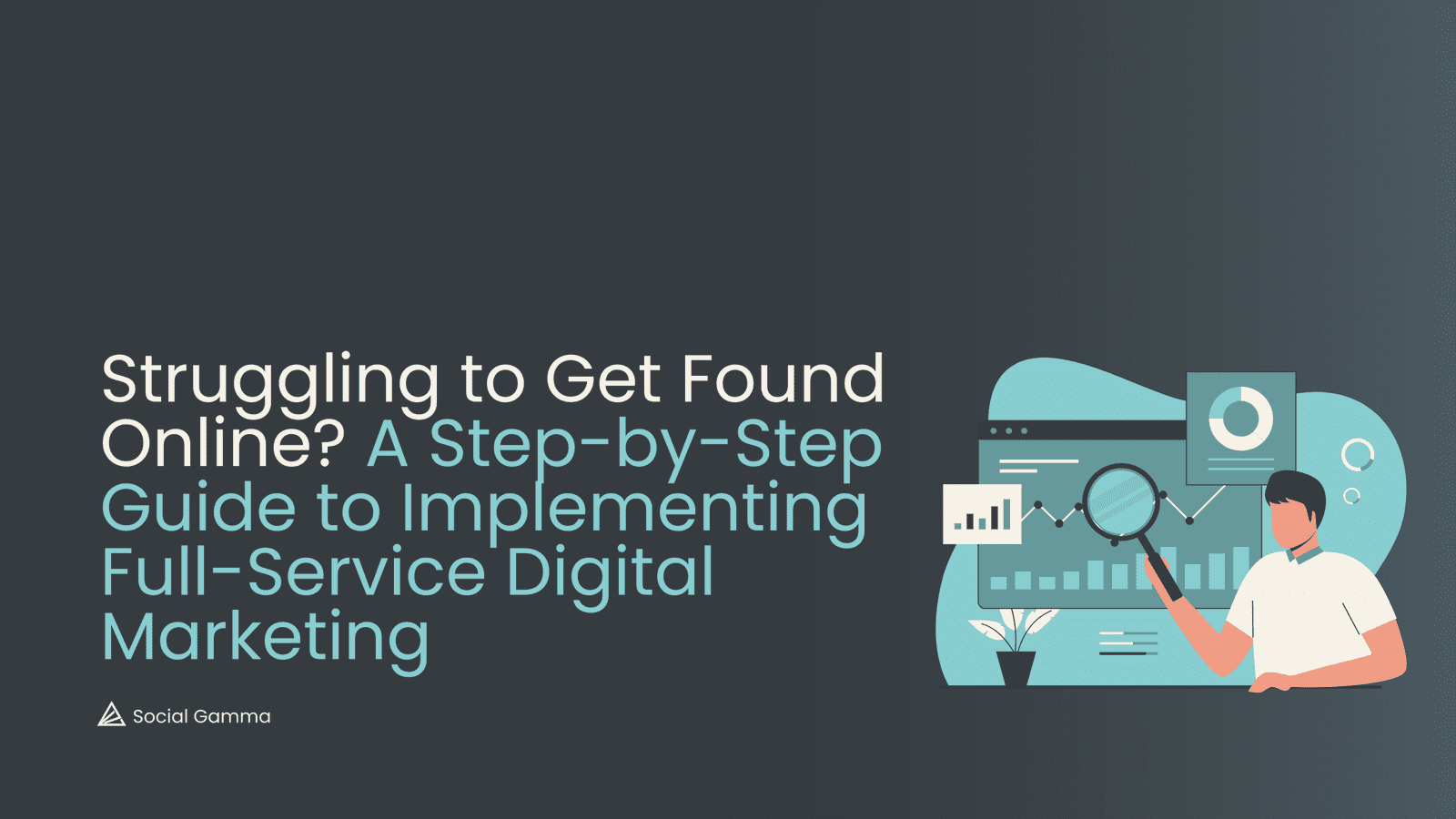Having a strong online presence is essential for any business or website, and at the core of any successful online presence, you’ll find a well-structured search engine optimization (SEO) strategy. It’s an integral part of any digital marketing strategy.
An efficiently optimised website will allow you to drive organic traffic, boost visibility, and ultimately achieve your goals. However, for many businesses and website owners, the world of SEO can seem overwhelming and complex (which it is!)
If you’ve ever found yourself struggling to improve your website’s SEO performance, make sure to keep reading…
From on-page optimisation and keyword research to technical SEO and link building, we’ll cover it all, providing you with actionable steps that can be implemented and tracked to start elevating your SEO within a month.
Contents
- 1 Days 1-5: Define Your Target Audience
- 2 Days 6-10: Perform an SEO Audit
- 3 Days 11-15: Perform Keyword Research Regularly
- 4 Days 16-20: Optimise your On-Page SEO
- 5 Days 21-25: Improve Your Website Loading Speed
- 6 Days 26-30:
- 7 Enhance User Experience (UX)
- 8 Build High-Quality Backlinks
- 9 Continue to Monitor, Analyse, and Adapt
- 10 Final thoughts…
- 11 About us
Days 1-5: Define Your Target Audience
Understanding who your audience is and what they’re searching for is an essential step to creating a successful SEO strategy.
By gaining insights into their demographics, interests, and search behaviors, you can create a tailored approach that resonates with your ideal customer and attracts relevant, organic traffic.
- Conduct thorough research on their demographics, interests, and search behaviors.
- Develop buyer personas to gain a clear understanding of your ideal customers.
- Use this knowledge to tailor your content, keyword strategy, and website optimisation.
- By meeting the needs of your target audience, you’ll attract more relevant and organic traffic.
Days 6-10: Perform an SEO Audit
To optimise your website’s performance in search engine rankings, a comprehensive SEO audit is essential.
You can uncover areas for improvement and identify technical issues that may be hindering your SEO efforts.
- Ensure search engine users can easily navigate and index your pages.
- Check for broken links, duplicate content, and other issues that impact search engine visibility.
- Utilise tools like Google Search Console and SEO auditing software to gather data and insights.
- Identify areas for improvement and develop strategies to enhance your website’s SEO performance.
Days 11-15: Perform Keyword Research Regularly
Keyword research forms the backbone of an effective SEO strategy, as it enables you to align your website’s content with the search queries of your target audience.
Identify relevant keywords and incorporate them strategically to increase your website’s visibility in search engine results.
- Use keyword research tools like Google Keyword Planner, SEMrush, or Ahrefs to uncover valuable keywords in your industry.
- Look for keywords with a high search volume and moderate competition to strike a balance between visibility and achievability.
- Consider long-tail keywords, which are more specific and longer phrases, as they can bring targeted traffic to your website.
- Incorporate these keywords naturally into your website’s content, including page titles, headings, meta descriptions, and body text.
- Aim to create high-quality, informative content that aligns with the purpose behind the keywords you’ve identified.
Remember, keyword research is an ongoing process!
Days 16-20: Optimise your On-Page SEO
To enhance your website’s visibility in search engine results, optimising on-page elements is essential.
By strategically optimising title tags, meta descriptions, header tags, and content structure, you can improve your website’s relevance and appeal to both search engines and users.
- Create compelling meta descriptions that entice users to click on your search result.
- Ensure that your content is well-structured with proper headings (H1, H2, H3 etc.) to enhance readability and guide both users and search engines.
- Include relevant keywords naturally throughout your content, without compromising the quality and readability.
- Make sure your URLs are concise, descriptive, and contain target keywords where appropriate for better rankings.
Days 21-25: Improve Your Website Loading Speed
Website loading speed plays a significant role in both user experience and SEO performance.
A slow-loading website can lead to high bounce rates, lower engagement, and even lower search engine rankings.
- Optimise your website’s loading speed by compressing images without compromising their quality. Use tools like Photoshop or online image compressors to reduce the size of files.
- Condense CSS and JavaScript files by removing unnecessary characters and code, improving the efficiency of your website’s loading process.
- Use browser caching to reduce any server response time and enable returning visitors to load your website faster.
- Consider using a content delivery network (CDN) to enable access to your content from servers closer to the user’s location.
- Regularly monitor your website’s loading speed by using tools like PageSpeed Insights or GTmetrix. These tools provide insights and tips to improve speed and efficiency.
Days 26-30:
Enhance User Experience (UX)
A key aspect of achieving SEO success is delivering an exceptional user experience (UX) on your website.
When users have a positive experience, they are more likely to engage with your content, stay longer on your site, and potentially convert into customers.
- Ensure your website has clear and intuitive menu structures, making it easy for users to navigate.
- Improve readability by using proper formatting, including headings, subheadings, and bullet points to make the text more scannable.
- Make your website mobile-friendly! This ensures that your site adapts seamlessly to different screen sizes and devices, providing a consistent user-friendly experience.
- Optimise page loading speed, as discussed earlier, to enhance UX by reducing any waiting times and improving your site’s performance overall.
Build High-Quality Backlinks
Building high-quality backlinks is a vital aspect of a successful SEO strategy.
Backlinks from relevant websites tell search engines that your website is trustworthy and valuable.
- Create valuable content that naturally attracts backlinks from other websites.
- Look for guest posting opportunities with relevant websites and influencers.
- Promote your content on social media.
- Monitor any brand mentions and request backlinks where your business is mentioned.
- Prioritise quality over quantity by focusing on relevant sources.
Continue to Monitor, Analyse, and Adapt
Monitoring, analysing, and adapting are critical components of any successful SEO strategy.
By regularly assessing your website’s performance, you can identify opportunities for improvement and make informed decisions to optimise your SEO.
- Use analytics tools like Google Analytics to track your website’s traffic, user behavior, and conversions.
- Pay attention to key metrics such as organic traffic, bounce rate, average session duration, and conversion rates to monitor the effective your SEO is.
- Use the insights to identify areas for improvement and prioritise optimisation strategies.
- Stay up to date with industry trends and algorithm updates.
- Continue to test and refine your SEO strategies based on the feedback you obtain.
- Regularly assess and adjust your keyword targeting.
- Keep an eye on your competitors’ SEO strategies and adjust your approach accordingly.
Final thoughts…
By following these steps and consistently working on enhancements, you can gradually transform your website’s SEO performance and experience improvements in organic traffic, search engine rankings, and overall online visibility.
Remember to be patient… SEO results can take time to materialise, but with dedication (and perhaps a little help from Social Gamma) you will place yourself in a position for long-term success!
Ask yourself…
- How can I provide even more value to my audience?
- What unique insights or offerings can I bring to the table?
- How can I engage and captivate my audience in a way that sets my business apart?
About us
At Social Gamma, our digital marketing solutions merge empowerment and expertise, driven by meticulous analysis and unrivaled insights that breathe life into your aspirations.
We embrace the art and science of digital marketing, combining data-driven strategies with human insights to create impactful campaigns that leave a lasting impression.
We’re big enough to achieve, but small enough to care.
Do you want to know more?
If you found this article interesting and useful, follow us on our social media channels to stay updated with our weekly digital marketing insights.
If you want to learn more about our services then contact us!


